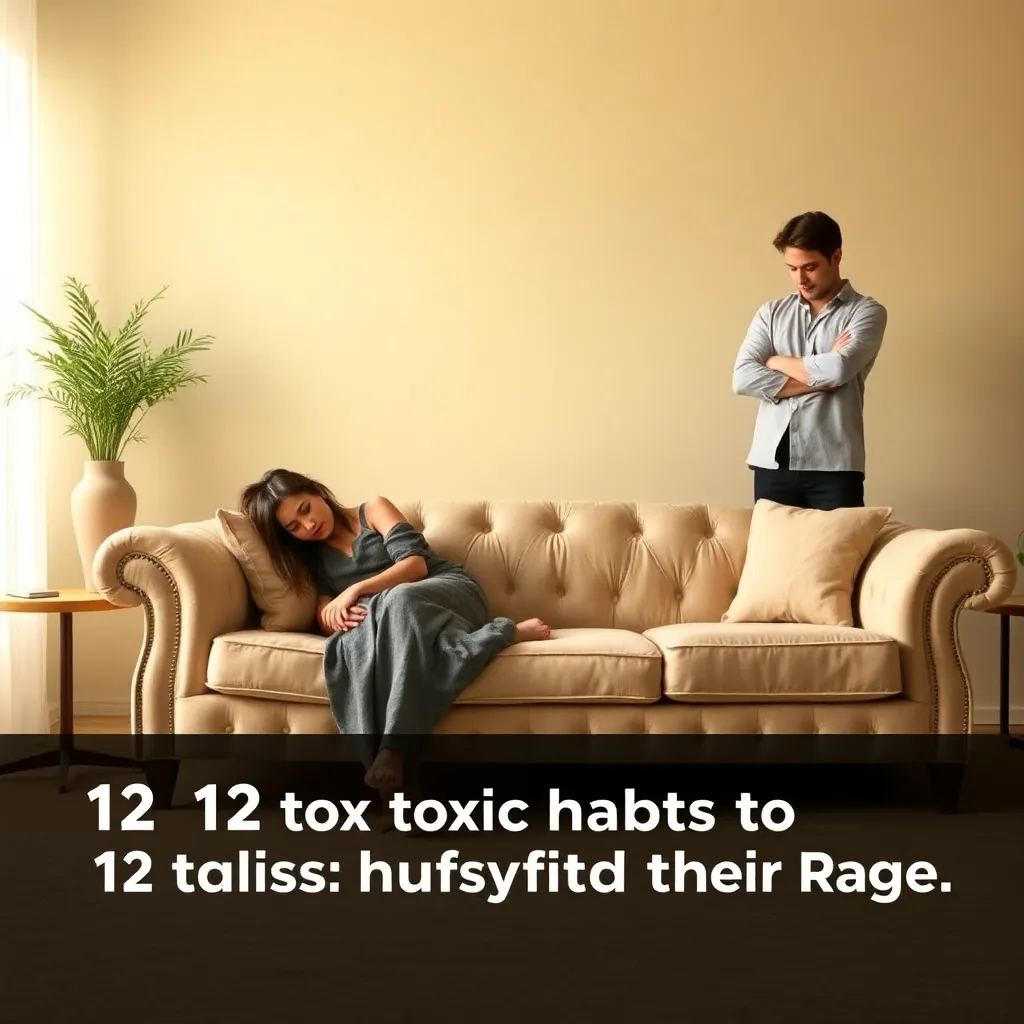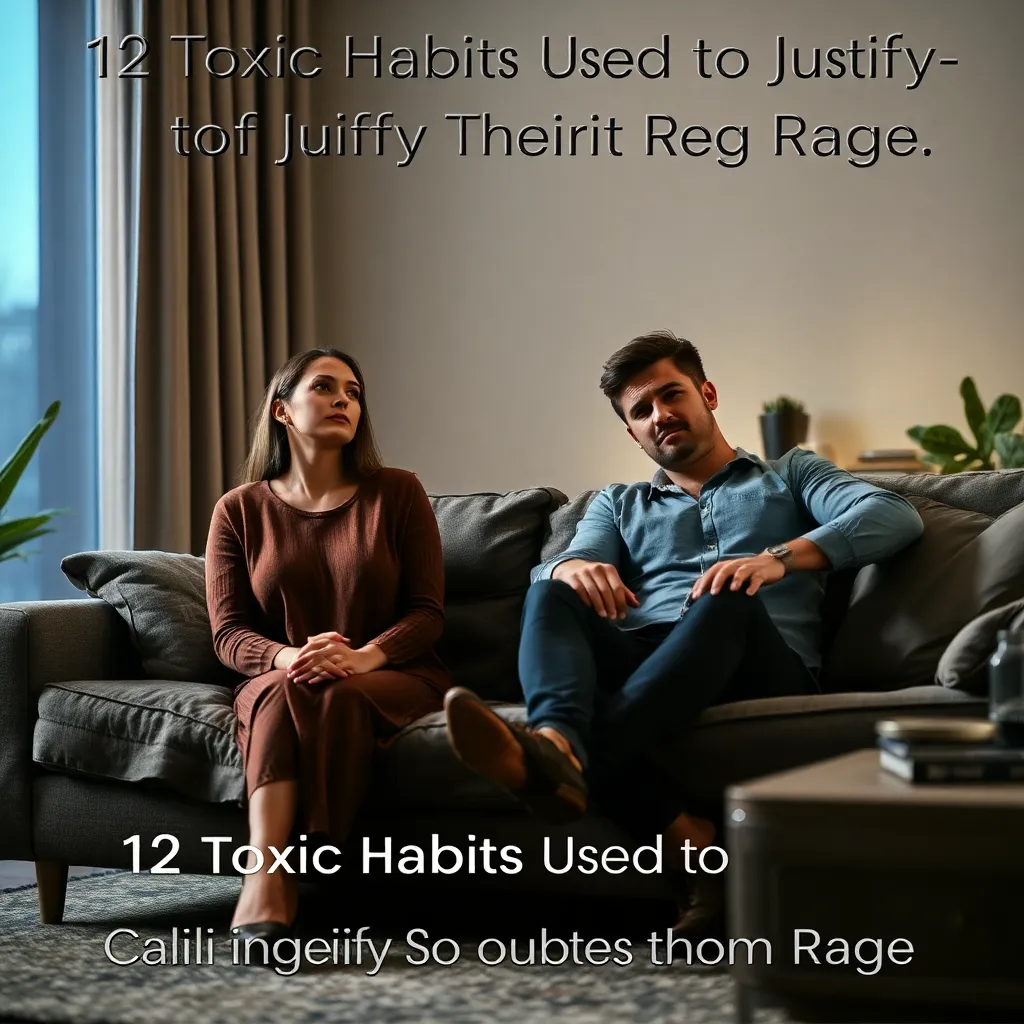In the intricate landscape of human relationships, understanding the roots of conflict can sometimes feel like navigating a maze. If you’ve ever found yourself questioning whether the anger directed at you is justified, you’re certainly not alone. Anger, when wielded as a tool of control, can morph into a destructive force, leaving you feeling confused and hurt. Recognizing the toxic habits that disguise themselves as justifiable rage is a crucial step toward healthier interactions.
This article invites you to explore the hidden dynamics that fuel such toxic behaviors. We aim to provide you with insights into 12 specific patterns that individuals might use to rationalize their anger. By shedding light on these habits, our goal is to empower you with the knowledge to recognize and address them in your own life. Through a compassionate lens, we seek to equip you with the tools to navigate these challenging situations with confidence and clarity.
1. Blaming Others for Their Anger

In many relationships, it’s common to encounter the habit of blaming others for one’s anger. This tactic is often used to avoid taking responsibility for one’s emotions, shifting the burden onto their partner instead.
Imagine a scenario where a partner comes home in a bad mood and immediately starts an argument, blaming their significant other for their bad day. This not only creates a toxic environment but also erodes trust and emotional safety in the relationship over time.
Experts suggest that understanding and recognizing this behavior is the first step toward change. When anger is misdirected, it is crucial to pause and reflect on the real source of frustration, rather than projecting it onto a loved one.
Open communication and empathy can significantly help in breaking this cycle of blame. Encouraging your partner to express their feelings without resorting to accusations can foster a more constructive dialogue.
Ultimately, building a relationship where both partners take responsibility for their emotions can lead to a healthier, more supportive connection. This approach paves the way for growth and deeper understanding, strengthening the bond between partners.
2. Minimizing Their Hurtful Words

In many relationships, one partner may engage in the toxic habit of minimizing their hurtful words, making it seem as if their comments were no big deal. This can leave the other person feeling confused and invalidated, unsure of whether their feelings are justified.
Consider a scenario where one partner dismisses their hurtful comments as just “jokes” or says, “I was just kidding, don’t be so sensitive.” Such statements can be damaging and create a cycle where the hurt feelings of the other person are constantly undermined.
Experts suggest that acknowledging the impact of words is crucial in maintaining a healthy relationship. If you find yourself on the receiving end of this behavior, it’s important to express how those words affect you and establish clear boundaries.
To foster healthier communication, partners should actively work on validating each other’s emotions rather than brushing them aside. This involves truly listening and acknowledging the impact of words, which can pave the way for a more understanding and compassionate relationship.
3. Using Past Trauma as Excuse

Many individuals use their past trauma as a shield to deflect responsibility for their actions. It’s important to understand that while trauma can indeed affect behavior, it should not be a blanket excuse for toxic actions or words.
Consider a scenario where someone frequently lashes out at their partner, citing a difficult childhood as the root cause. While their history may explain their behavior, it does not excuse the hurtful impact on their partner.
Experts suggest that acknowledging one’s own triggers and patterns is crucial. This self-awareness can be the first step toward healing and preventing further harm in relationships.
Instead of justifying rage, individuals should focus on seeking therapy or support groups to work through their issues. Healing from trauma is a journey that requires effort, but it leads to healthier interactions.
Ultimately, using past trauma as an excuse only perpetuates a cycle of pain. By taking accountability and seeking help, individuals can transform their relationships into more supportive and loving environments.
4. Projecting Insecurities onto Partner

In relationships, it’s not uncommon for individuals to unconsciously begin projecting their insecurities onto their partner. This can create a cycle of blame and misunderstanding, making it difficult for both parties to feel truly seen and heard.
For example, someone who feels inadequate may constantly question their partner’s commitment, assuming their own fears are justified. This can lead to unnecessary arguments and emotional distance, eroding the trust that is crucial for any healthy relationship.
An effective way to address this issue is through open communication and self-reflection. By recognizing personal insecurities and discussing them honestly, couples can work together to build a stronger, more understanding bond.
Experts suggest that couples should practice active listening to better understand each other’s perspectives and alleviate misunderstandings. This approach helps in transforming potential conflicts into opportunities for deeper connection and empathy.
By addressing projection with empathy and patience, couples can enhance their emotional connection and reduce tension. Ultimately, this leads to a more balanced and harmonious partnership, where both individuals feel valued and respected.
5. Dismissing Partner’s Valid Concerns

In many relationships, a partner might find themselves feeling unheard when their valid concerns are dismissed. This behavior can stem from a fear of vulnerability or an inability to handle criticism, which can escalate into rage when those feelings are threatened. For example, if one partner raises concerns about financial decisions, the other might react defensively, feeling as though their competence is being questioned. This defensive posture often manifests as anger, masking the underlying insecurity.
It’s crucial to recognize that dismissing your partner’s concerns is not just about avoiding conversations; it’s about undermining the foundation of trust. When valid concerns are brushed aside, it sends a message that your partner’s feelings and thoughts are not important, leading to resentment and emotional distance. Consider a couple where one partner frequently complains about feeling neglected, only to be told they’re overreacting. This dismissive response invalidates their experience, creating a rift that can be hard to mend.
Experts suggest that actively listening and acknowledging your partner’s concerns can significantly improve relationship dynamics. Instead of dismissing their worries, try to understand the underlying emotions that fuel those concerns. Engaging in open dialogues where both parties feel heard can transform moments of tension into opportunities for growth. This approach not only diffuses potential conflicts but also strengthens the bond between partners.
Ultimately, addressing valid concerns with empathy and openness can pave the way for a more harmonious relationship. By fostering an environment where both partners feel safe to express themselves, you build a stronger, more resilient connection. Remember, every concern shared is an opportunity to deepen your understanding of each other, creating a more fulfilling partnership.
6. Weaponizing Silence and Withdrawal

In some relationships, individuals use silence and withdrawal as a weapon to express their anger. This behavior, often referred to as the “silent treatment,” can leave the partner feeling confused and isolated, unsure of how to bridge the gap.
Instead of resolving conflicts, the silent treatment creates a barrier between partners, making it difficult to address underlying issues. Over time, this can lead to resentment and a breakdown in communication, as one partner feels perpetually unheard and undervalued.
Consider the example of a couple who frequently finds themselves in disagreements. When one partner consistently resorts to silence, the other may start to feel anxious and rejected, questioning their own worth in the relationship.
Experts suggest that open communication is crucial to overcoming the pitfalls of silence and withdrawal. By replacing silence with constructive dialogue, couples can work through disagreements more effectively and nurture a stronger, more understanding connection.
Ultimately, recognizing and addressing the habit of weaponizing silence can lead to more meaningful interactions. By fostering a proactive approach to communication, couples can build the resilience needed to weather inevitable conflicts together.
7. Exaggerating Situational Triggers

In many relationships, individuals might find themselves exaggerating situational triggers to justify their emotional outbursts. For instance, a partner might claim that a minor inconvenience, like a forgotten grocery item, is a sign of complete disregard for their needs. This tendency to blow things out of proportion often stems from underlying insecurities and can create a cycle of conflict and misunderstanding.
Imagine a scenario where one partner comes home late due to traffic, and the other sees this as a deliberate act of neglect. Instead of addressing the core issue calmly, they might unleash their frustration in the form of anger, claiming that this one event is indicative of a larger pattern. This pattern of behavior can erode trust and create an environment where neither partner feels secure.
Experts suggest that these exaggerated reactions are often rooted in unmet emotional needs or past experiences that haven’t been resolved. By addressing these underlying issues, couples can foster a deeper understanding and work towards healthier communication. Engaging in open dialogues about each other’s triggers and emotional landscapes can significantly reduce the frequency of these exaggerated responses.
Ultimately, the key takeaway is that by recognizing and addressing the real issues behind these exaggerated triggers, couples can move towards a more harmonious relationship. The goal is to replace assumptions with empathy and to transform misunderstandings into opportunities for growth. By doing so, partners can build a foundation of trust and mutual respect that withstands the test of time.
8. Demanding Unconditional Forgiveness Always

Demanding that someone offers you unconditional forgiveness is a common tactic in toxic relationships. This behavior often leaves the other person feeling guilty for holding onto their justified hurt or anger. Picture a scenario where one partner repeatedly makes the same hurtful mistake, yet expects a clean slate each time. Over time, this not only erodes trust but also places undue pressure on the wronged partner to constantly forgive.
Forcing forgiveness can create a cycle where one partner feels obligated to overlook repeated offenses. In a healthy relationship, both parties should be willing to acknowledge mistakes and work towards meaningful change. According to Dr. Harriet Lerner, a renowned psychologist, true healing occurs only when there is genuine remorse and a commitment to alter harmful behaviors. This insight highlights the importance of mutual respect and shared effort in creating a nurturing relationship.
Expecting forgiveness without change can be deeply damaging. It often leads to a dynamic where one partner feels trapped, and their emotions are invalidated. A personal story shared by a reader illustrates this vividly: “Every time I forgave without seeing any changes, I felt like I was losing a piece of myself.” This highlights the emotional toll that such demands can take, emphasizing the need for boundaries and self-preservation.
To foster a healthier relationship, it’s essential to cultivate an environment of understanding and accountability. Instead of demanding forgiveness, partners should focus on demonstrating genuine efforts to improve. This not only strengthens the bond but also builds a foundation of trust and respect. As you navigate these conversations, remember that forgiveness is a gift, not an obligation.
9. Gaslighting to Avoid Responsibility

When a partner engages in gaslighting, they manipulate reality to shift blame and evade responsibility. This toxic behavior often leaves the other person feeling confused and doubting their own experiences. Imagine planning a special evening together, only for it to be dismissed as something you misremembered. Over time, such experiences can erode trust and self-esteem in any relationship.
In these scenarios, the gaslighter might twist words, deny previous promises, or even fabricate events to maintain control. The aim is to make the other person question their perceptions and ultimately take responsibility for issues they didn’t cause. A common example might be a partner claiming they never agreed to a particular decision, despite clear evidence. This not only shifts the focus away from their actions but also places an unfair burden on the person being gaslit.
Breaking free from this cycle requires a conscious effort to validate your reality and seek external perspectives. Keeping a journal of events and conversations can serve as a grounding tool when doubts creep in. It’s also beneficial to reach out to trusted friends or a therapist who can offer clarity and perspective. Gaslighting thrives in isolation, so sharing your experiences can be a powerful antidote.
Ultimately, understanding the signs of gaslighting can empower you to make informed decisions about the health of your relationship. Prioritizing open and honest communication is crucial in dismantling these toxic habits. By taking these steps, you can foster a more respectful and supportive partnership.
10. Playing the Victim Constantly

Playing the victim constantly can be a subtle yet powerful tool used to justify rage. When someone perpetually casts themselves as the wronged party, it allows them to deflect responsibility and garner sympathy.
In relationships, this behavior can manifest when one partner always feels they are being mistreated, regardless of the situation. This mindset creates a dynamic where they can express anger without accountability, as their actions are seen as justified responses to their perceived suffering.
Consider a scenario where one partner frequently complains about feeling neglected, even after efforts are made to address their needs. This constant victimhood can wear down the other partner, leading them to walk on eggshells to avoid further conflict.
Experts suggest that recognizing this pattern is crucial for maintaining a healthy relationship. By identifying instances of exaggerated victimization, partners can work together to create a more balanced and supportive dynamic.
Ultimately, addressing the tendency to play the victim can transform interactions from defensive to collaborative. By focusing on shared goals and solutions, partners can move beyond blame to create a more harmonious relationship.
11. Justifying Jealousy as Love

In many relationships, jealousy is often misinterpreted as a sign of deep love, but in reality, it can be a manifestation of insecurity and control. When someone says they’re jealous because they love you so much, it can be a red flag that their feelings might be more possessive than affectionate.
Consider this scenario: One partner constantly checks the other’s phone, questioning every interaction with friends or colleagues. While it might be easy to brush off such behavior as caring or protective, it often undermines trust and creates a toxic environment.
Experts suggest that healthy relationships are built on trust and open communication rather than surveillance and suspicion. By addressing jealousy openly, partners can work together to establish boundaries and foster a secure connection.
The key takeaway here is that jealousy should not be confused with love, as it can quickly lead to resentment and distance. By recognizing and addressing these feelings, couples can move towards a more honest and supportive relationship dynamic.
12. Claiming Stress as an Outburst Excuse

When someone claims that their outbursts are due to stress, it can often feel like an unavoidable part of life. Yet, it’s essential to recognize that using stress as an excuse for rage is a toxic habit that can damage relationships.
Consider the scenario where a partner comes home from a demanding day at work and explodes over minor issues. This kind of behavior might be excused as stress-related, but it’s crucial to understand that it’s not an acceptable way to handle emotions.
Experts suggest that while stress is a common part of life, it does not give anyone the right to be hurtful or aggressive. Instead, partners should communicate openly about their feelings and work together to find healthier outlets for stress.
One effective strategy is to set aside time to discuss stressors calmly, before they escalate into anger. By doing so, couples can create a safe space that encourages understanding and empathy, reducing the likelihood of harmful outbursts.
Ultimately, addressing stress in constructive ways can strengthen the bond between partners, rather than tear it apart. The key takeaway is to prioritize empathy and communication over using stress as an excuse for rage, ensuring a healthier and happier relationship.
Conclusion: Creating Beautiful Outdoor Spaces
In exploring the ’12 Toxic Habits Used to Justify Their Rage,’ we’ve journeyed through patterns such as deflection, stonewalling, gaslighting, and passive-aggressiveness, among others. These habits often serve as masks for unresolved anger and can erode the foundation of any relationship. Recognizing these behaviors is the first step toward healthier interactions. Now, it’s time to turn awareness into action.
Begin by selecting one habit you’ve identified in your relationship, whether it’s yours or your partner’s, and commit to addressing it openly and compassionately. Communication is key; have an honest conversation about how these habits impact your relationship and explore solutions together.
As you embark on this journey of growth, be sure to bookmark this article for quick reference. Its insights can guide you back to equilibrium when emotions run high.
Remember, every relationship has its ups and downs, but through commitment and understanding, success is attainable. By tackling these toxic habits, you pave the way for a deeper connection and a more resilient partnership. Your proactive efforts today can transform your relationship into a thriving, supportive bond tomorrow.
